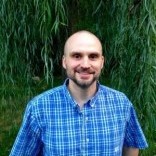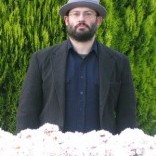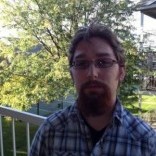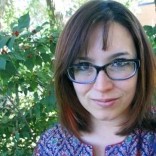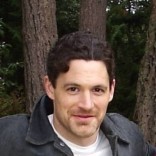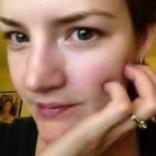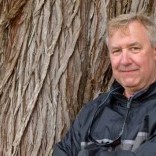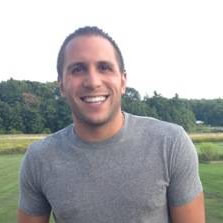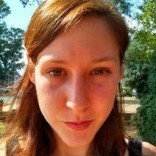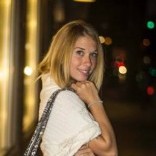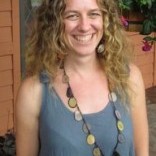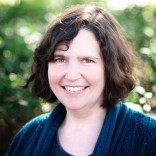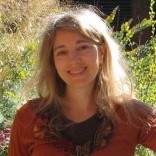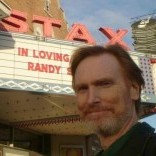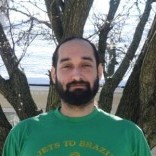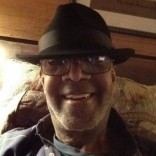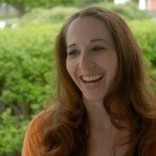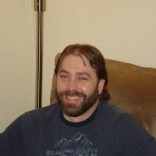The Flying Man
Michael Compton
In my mind, the only appropriate reaction to seeing a man fly is wide-eyed wonder, the look of awed delight that turns every face, no matter how old or hardened, into that of a child. It is Bobby’s look—my six-year-old—those times on the front lawn when we spotted the Flying Man, flitting and swooping in the starry shadows just above the glow of the streetlights. That expression on my son’s face, that upwelling of his pure spirit, is so wonderful to look upon that I forget the Flying Man and just watch Bobby’s eyes, soaring on the updrafts of his imagination. This, I think, is my purpose: to introduce—but not just to introduce—to shepherd, to witness, to cherish my son to the marvels and mysteries of the universe. This is what I am here for.
It is a strange thing—to me, at least—that not everyone reacts to the Flying Man in the same wide-eyed way. If someone pricks a finger, for example—or tastes chocolate, or sees a newborn baby—we expect a certain reaction. And one would think that the sight of a seemingly ordinary man taking to the air without the aid of wings or wires or balloons or rockets on his shoes would elicit a common response. None of the rest of us can do it, after all, and to see the Flying Man glide above the rooftops as casually as a neighbor out for an evening’s stroll is to see a miracle. But the truth is, if one only observes people’s behavior with even a bit of scientific distance, it becomes obvious that we do not all react the same way to seeing a baby, or tasting chocolate, or even to pricking a finger. Reactions evolve. They can even be learned. But between the stimulus and the reaction is the feeling, the elemental sensation. Do we learn—or unlearn—those as well? A flying man is a strange thing. But to me, even stranger, is indifference to the miraculous.
By my observation, the most common immediate response upon spotting the Flying Man is the exclamation, “There he is!” followed by an emphatic jab of the finger at full arm’s length and a whipsawing of every head in the vicinity to get a look. His appearances are not few, but they are fleeting, as he habitually flies low to the treetops and is almost never glimpsed in full view, suspended in the naked air. Like an enormous partridge, he keeps close to ground cover, and he has yet to be flushed into the open sky. When he is spotted, one rarely sees more than a half-obscured torso, or a leg or a foot, disappearing behind the foliage. But as he progresses amongst the treetops, glimpses of a leg here, a foot there, a hand, a shoulder—even that face, with its rapt eyes and wan line of a smile—create a collage of images in the mind that coalesce into a singular whole, much as the persistence of vision creates the illusion of a moving image from a series of static frames.
And someone will say, “Where’s his cape?” or some such remark, which itself elicits a variety of reactions. Many just ignore the question, since, by now, they have heard it so many times before. Others laugh that obligatory laugh one uses to acknowledge a joke as a joke, without necessarily endorsing it as truly funny or original. Many roll their eyes, as at a tired pun, and yet some guffaw with thoughtless abandon, to be shushed like children by those who see the Flying Man as no laughing matter, whether he is an object of their sincere reverence or heartfelt outrage. Others, equally parental in instinct, perhaps, but following the dictum of patience rather than severity, take the question at face value and acknowledge that the Flying Man does, indeed, confound expectation.
In short, the Flying Man is no costumed super hero, no angel, no bat-winged demon or vampire, no gryphon dredged up from our mythological past nor alien horror conjured out of our collective Hollywood unconsciousness. He is just a man, and a seemingly ordinary man at that, dressed in khakis—or jeans on the weekend—with a neatly tucked-in polo shirt of a dark blue or black, and running shoes with silver reflectors on the soles. He is everyone’s next-door neighbor: Dark hair, medium complexion, medium build, indeterminate ethnicity, the kind of fellow one could picture working behind the counter at some local retailer. Or, like me, the Information Desk at the public library. By now, everyone knows this. They’ve heard the stories, they’ve seen the blurry photos and shaky smart phone videos. And yet, they are still surprised, even those whose pop culture allusions come automatically, who wear their postmodern, ironic sensibility as casually as they wear their T-shirts and jeans.
Personally, when I hear such sarcastic quips—and I have heard them many times—I wonder what is real to such people. Are their minds so chock full of projected shadows and colored-in line drawings that they have no room in them for the plain light of day? For it is clearly the plainness of the Flying Man that shocks them. He is unreal because he is real, and to the many who would scarce raise an eyebrow were they to see some over-muscled titan in a shimmering suit zooming across the sky, the spectacle of an apparently ordinary man gliding through the air is not a thing of wonder but of smug mockery.
Children and the elderly seem to have the purest reactions. Their eyes sparkle, their mouths gape, as if they are ready to lap him up like ice cream. In those early, quiet days, when the Flying Man was strictly a neighborhood phenomenon, it gave me a great sense of joy to see the faces of the old and the young among my neighbors lifted together to share in the wonder. My most cherished moment came on the evening I had my dad and my son together, standing out on the front lawn, their two faces mirrors of childish delight.
But the time for fathers and sons to enjoy quiet moments watching the Flying Man from the lawns and back porches of their peaceful homes was brief. Once word spread beyond our neighborhood, the gawkers began to stream in. There was a story in the local paper. Then a spot on the news. When the national networks picked it up, the frenzy began. For weeks afterward, our sleepy little enclave was overrun by a mechanized cavalry of camera trucks, police cars, and out-of-town SUVs, spilling out hordes of invaders bristling with their peculiar armaments: cameras, lights, microphones, satellite dishes, and in the case of the city’s SWAT team—called to the scene for who-knows-what contingency—even automatic rifles. For a brief time, images of the Flying Man appeared on every news broadcast, in every paper and magazine, around the world. The shaky video clips were ubiquitous. The face, captured in one fuzzy but indelible image—eyes rapt and far-seeing, lips spread in a gentle, god-like smile—became iconic, hallowed in that most extraordinary place of contemporary honor, the T-shirt. He was everywhere and yet nowhere, for no one could get to him, no one knew who he was, no one stepped forward to identify him.
This elusiveness, at first, only amplified the public’s urgency to know, and the spillers of words, both professional and amateur, filled every form of media imaginable with their speculations and pronouncements. A great deal of energy was expended in deciding what to call the Flying Man, as if “The Flying Man,” which is what nearly everyone actually called him, was too pedestrian. And yet, it was the Flying Man’s very pedestrian nature which every nickname seemed designed to poetically evoke. Among the names tried out for him—most of which were quickly drowned in the flood of media chatter—were “The Soaring Suburbanite,” “The Neighborhood Nighthawk” (since he flew mostly after dusk), “Polo Man,” “Khaki Man,” “The No-Cape Crusader,” and “The Winged Wal-Mart Greeter.” It was also tediously common to hear him alluded to as “Your Friendly Neighborhood Flying Man” (or worse, “Flying Dude”), but when the mayor once referred on national news to our neighborhood as Blair Heights—a name few in our town under forty even know—the Flying Man immediately became “The Blair Heights Birdman.” Now, it is as if some irresistible worldwide authority has decreed that every story regarding the Flying Man must refer to him as “The Blair Heights Birdman” at least once. Most preferably, this is done in such a way as to imply that the phrase has been coined on the spot.
Fortunately, the frenzy has long since passed, the cavalry has retreated, and most mentions of the Flying Man in the media these days are of the “Whatever Happened To—” variety. The media can feed on unadulterated speculation for only so long, after all. Eventually, they must have someone to talk to besides themselves, and it is to the Flying Man’s everlasting credit that he denied them this. The more they sought him, the scarcer he became, until he disappeared completely. With nothing to see, the media people and gawkers did an abrupt about-face, from breathless credulity to utter cynicism. The Flying Man began to be referred to as a hoax, and the fact that hundreds of hoaxers had indeed created their own images of “flying” men and posted them on every form of electronic media only seemed to reinforce that conclusion.
By disappearing as he did, the Flying Man, whom we proudly claimed as a neighborhood man, proved that he was exactly that. He gave us back our neighborhood by removing himself from it, thus starving the media beast until it slouched its way to another Gomorrah. And he doubly gave us back our neighborhood, in a way, by allowing us to be reminded that we had a name, and a character, too; that even after years of trespass from chain stores and city planners, Blair Heights had maintained its uniqueness; that one could see it in the quaintness of the brick and stone bungalows, in the narrowness of the streets, in the ages of the trees, and in the sufficient friendliness of the people. And when the Flying Man slowly began to re-emerge, we returned the neighborly favor and kept news of his comings and goings to ourselves.
Like my neighbors, I was grateful, once the frenzy had subsided, to be able to walk outside my house again without being accosted by reporters, to have the streets uncluttered by satellite trucks, to have my lawn and my roses safe from trampling feet and churning wheels. But I was doubly grateful because Margaret, my ex-wife, who lives with my son in another town about an hour away, no longer had an excuse for withholding Bobby’s weekly visits. Margaret is not a rigid or vindictive person, but she has strong opinions on what makes a suitable environment for children. The day after the news of the Flying Man broke, rather than having me pick up Bobby at her house as I usually did, she insisted on bringing him to me. As she entered the city limits that Friday evening, the waves of out-of-town vehicles must have buffeted her little Prius like a storm surge, because she did not make it within a mile of the house before she phoned to say she couldn’t get through, and, in any case, she thought it best for Bobby not to visit again until things “calmed down.”
So for over a month, I only saw Bobby on his mother’s turf, taking him on brief, desultory little outings that reminded me of the early days of the break-up, when I was only allowed the briefest unsupervised visitation. Once things had “calmed down” I did not immediately request a return to our old arrangement, but rather gave it an extra couple of weeks, hoping she would be the one to suggest it. That didn’t happen, so the next time I called to say I was coming, I casually mentioned that she should pack Bobby’s overnight bag for the weekend.
“So this flying person is gone now?” she said, referring to the Flying Man in her usual way.
I told her that things were back to normal, but I did allow that the Flying Man wasn’t quite gone. She listened as I explained that he only appeared once or twice a week now, and only just after sunset or just before dawn, and no one was taking any more notice of him than they would any other neighbor out for a stroll.
She may have sensed that I was exaggerating a bit, because I could hear the gathering resolve in her voice as she replied that she would be bringing Bobby herself. “I want to see,” she said.
When they arrived, Margaret wore a look of exasperation, having spent an hour in the car being regaled by Bobby with everything he knew about the Flying Man. He especially liked to tell of the first time we saw him together, acting out his own comic double-take of amazement. Bobby’s enthusiasm at that time was such that Margaret immediately expressed concern, citing news reports of children—and even some grown men—injuring themselves in attempts to fly.
“I don’t want Bobby tying a blanket around his neck and jumping off a roof,” she had said. My reply that the Flying Man didn’t wear a cape didn’t seem to mollify her.
She was in a better humor on this occasion, however, looking glad for adult reinforcement as she followed Bobby in the door, dropping her bag as she used to in the chair, and just catching herself before greeting me with a side-swiping kiss. I covered the awkward moment by offering them lemonade, which they enjoyed on the back patio as I grilled hotdogs. When she saw the bright red links sizzling over the coals she said, “Oh—” and nothing else, but in my mind I filled in the blank: “Oh, we’re still eating processed meat?”
The construction, “We’re still,” uttered in a questioning tone, followed by the appropriate participle and noun to describe whatever thing or activity I happened to proffer for the family’s enjoyment, had become a pet expression of hers. Since the divorce, only two years ago, I noticed that she had taken on a whole array of new interests and tastes, but what was remarkable to me was that she never seemed disposed to simply add on; instead, she must erase and replace. It could not be, for example, that she now simply preferred a veggie dog or a Kobe steak—it must be that she was mistaken to have ever considered a hot dog to be edible in the first place.
“They’re kosher,” I said, punctuating the quip with a smile.
“That’s a strange thing to say,” she replied.
I was grateful, at least, that Bobby was too young to follow the exchange, because he would have agreed with her. His ears were not yet attuned to the deeply encoded dialogue his parents shared, nor was he old enough to remember, that first time my then-fiancée had asked me about my preferred brand of franks, my lame joke about “keeping the 4th kosher.” I felt barely capable of keeping up with her inferences and allusions now, and fairly cringed at the multiplying levels of play that lay ahead of me in Bobby’s maturing years, especially with the inevitable addition of new mates, step-children, and half-siblings. I was not looking forward to that fast-approaching day when my own child would respond to some innocent remark of mine with a cool look and a roll of the eyes shared with another, even if the sharer was his own mother.
After our meal, when we had settled on a blanket on the front lawn, Margaret asked how I could be sure the Flying Man would be out that night. Bobby replied, “He always comes out on Friday night.” She glanced at me as if she knew I was the source of that bit of information, and it bothered her, I suppose, that there were things that Bobby and I shared now that she was not privy to, just as the reverse bothered me.
“Most people think he’s got a regular nine-to-five job,” I said. “After the work week is over, this is just his way of blowing off steam.”
“And he never comes out in the day time?”
“Not any more. It’s always last light, like now, or early in the morning.”
The last sliver of sun had just dipped below the horizon, and as the scattered clouds slowly turned from red to gray, I became nervous. Since the Flying Man’s return, his route was much more variable, and there was no guarantee that he would pass over the house that night. I both wished he would, and wished he wouldn’t.
To fill the minutes while we waited—or to cover my nervousness, perhaps—I recalled something I’d heard at the library’s Story Hour. It was the old African American folk tale in which the slaves, coming into contact with new arrivals from Africa, are reminded of who they are and where they come from, and with a few words in the native tongue from a forked-bearded old man, they recall their innate power of flight, spring into the air, and sail away to freedom and back to the motherland. That story reminded me of my own flying dreams, in which I realize that I had always had the ability to fly but had somehow just forgotten. The Flying Man was running later than usual that night—if he was coming at all—and I found that I kept talking, tying the notion of forgotten flight, rather pedantically, I suppose, to Plato’s Timaeus, in which he describes the soul as that pure part of our being that lies within us like a deeply buried memory. That, I conjectured, was what accounted for the Flying Man’s faraway, fixed expression. It was not a mask, as some had suggested, to conceal his identity, but rather the overawed projection of his inmost soul.
It was just as I noticed Margaret’s eyelids fluttering wearily that the Flying Man made his appearance.
“There he is!” Bobby whispered, but so suddenly and with such a jerk of his outstretched arm that he gave Margaret and me both a start.
He was difficult to see at first, just a shadow undulating above the trees.
“I see him,” I whispered back, just as he breached the gap between two poplars.
“Do you see him, Mom?”
Margaret said nothing yet, although her eyes seemed to be tracking his flight. And then the Flying Man did something unprecedented in my experience: he hovered. Directly above the street, in the widest space between the trees that lined each side, he paused, like a bumblebee rising above a flower. It was just a moment, but there he was, suspended in full view, his body angled about thirty degrees above the horizontal, his knees bent, his hands held out before him, palms open, as if testing the air. He was not quite silhouetted against the pale quarter moon above, not quite illuminated by the glow of the streetlights below, but every detail was clear. His eyes seemed to turn in our direction, though in that far-away expression of his I can’t say that they actually looked upon us. In his rapt, almost beatific demeanor, I could imagine that he was indeed a man in deep contemplation of the soul, one who had found the connection that enabled the material body to release its earthly burdens and join in the soul’s joyous flight.
“Oh my God—” I heard Margaret say, and then he was gone.
“He waved at me, Dad!” Bobby exclaimed. “I waved and he waved back! Did you see?”
“Yeah,” I said, not so sure, but giving his shoulder an encouraging squeeze.
Margaret was still staring at the spot above the streetlights, as if she could still see him.
“He’s so…”
Fantastic? Marvelous? Miraculous? My mind’s thesaurus provided a dozen words to complete that sentence, but I knew I couldn’t anticipate the one she would choose.
“Creepy.”
Bobby was oblivious to her mood. “Did you see him, Mom? Did you see him?”
“I saw him, Sweetie.” And to me: “I noticed you still keep that upstairs window open.”
“Just in summer. It’s good ventilation.”
She lowered her voice. “Did you know there are two registered sex offenders in this neighborhood?”
“No,” I said. “I didn’t know that.”
“You should look into these things. Come on, Bobby, it’s getting late. Time to go.”
Bobby raised objections, but Margaret answered/ignored each in her practiced, motherly way, managing to get him ready to leave as she continued talking with me.
“I really don’t think it’s a good idea for Bobby to stay overnight as long as that man is on the loose.”
“No,” I agreed, determined that this discussion would continue another day. “No, I guess not.”
And so they left.
I was tired, but I didn’t want to go to bed. The night air was warm and inviting, buzzing with the songs of crickets, cicadas, and tree frogs. I lay back on the blanket, the lawn’s Bermuda grass making a prickly cushion between me and the hard earth. Sadness pressed down on me, but as I stared up at the gap between the poplars I pictured again the Flying Man—hovering unsteadily, his hands outstretched, daring a quick wave to Bobby—and it made me smile.
Some people mock the Flying Man for what they see as his timidity in keeping so low to the ground, but I find that this trait only further endears him to me. He does not soar like the eagle of poetry and song, lording it over all that he surveys, reducing us, from his perspective, to the realm of crawling insects even as we exalt him to the angels. At one hundred feet or a thousand, the air rushing in his ears, the giddy weightlessness, even the feeling of detachment from earth-bound cares must be the same. By staying so close—close enough to exchange friendly hellos, if he were so inclined—the Flying Man seems to be saying, not “Look at me!” but “Follow me! You could do it, too!” And I confess, I have tried, lying on my blanket, watching the stars wink out and reappear as the Flying Man passes between on his irregular flight, imagining my body becoming weightless, levitating, leaving the ground by millimeters, feeling the Bermuda grass stiffen beneath me, the blanket peeling off my back like a shed skin, the air growing cooler as I rise faster, foot by foot, meter by meter, until I am up there, soaring with him, looking down at my blanket, my yard, my house—all my earthly remnants—as they shrink from sight.
Many a summer night I spend lying out on the lawn that way, sometimes not getting up again until first light, with the morning’s dew in my hair and eyes. I’m not the only one. All throughout the neighborhood, the old and young, fathers and sons, mothers and daughters, will sit or lie on their front lawns and back patios, finding that gap in the trees, that wedge of sky on which they can fix their eye, seeing the familiar, glowing bodies of the firmament, but looking for something else, something mysterious and wonderful, on those long, empty nights of the soul when the moon and stars are not enough.

